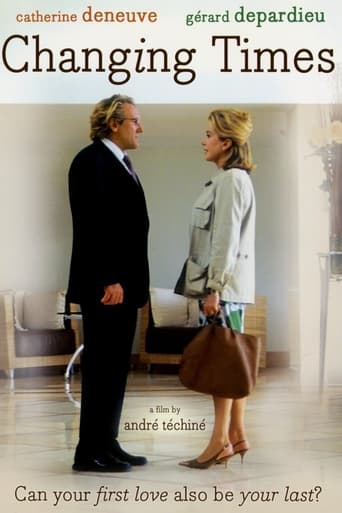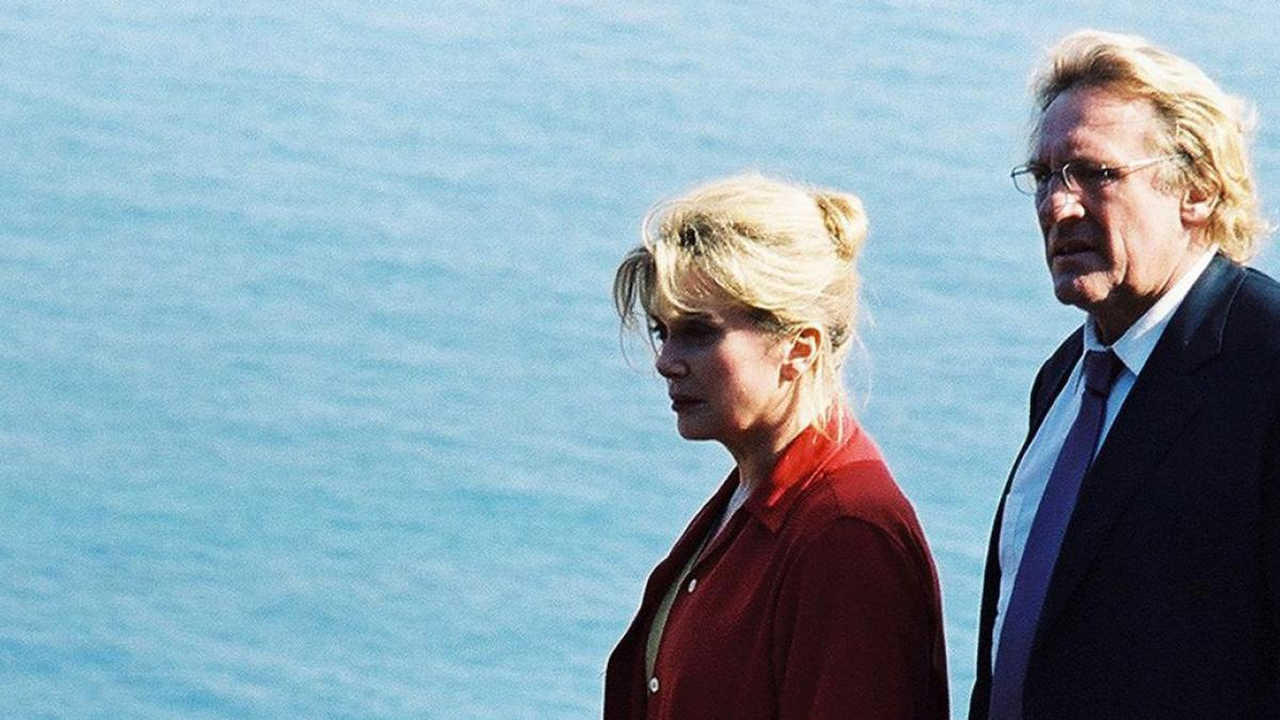jcappy
Can this failed, disjointed plot be saved? Is it is worth saving? I think so, but I am probably in the minority. I suggest that the pivotal relationship between Antoine Lavau (Depardieu) and Cecile (Deneuvre) be resuscitated. There's enough integrity in the film's early going to inspire a re-working of two protagonists. I think the trick is to avoid at all costs stereotyping, cynicism, canned emotions, and manipulative plot turns.First, Antoine is singular (original) and he must stay in character. He is not some freak of nature who needs a Hollywood re-cast. There are shy and introverted men who, often in their twenties, will experience a break-up, maybe from their first real love. A male of this mode, may weather the storm, but gradually his conviction grows that the initial lover was both rarer than what he imagined and possibly even irreplaceable. He may soon become convinced that he blew his one true chance at love. So his affective love gradually shifts back in her direction, displacing thoughts of a new relationship. He may resurrect her photos, be more cognizant of her life, adopt her preferences, and more rarely, prefer to live in more physical proximity to her.To one degree or another, such a man is under the influence of a romantic ideal. He needs to experience a sense of love, so he returns to the woman who compelled his passion. He realizes that while remarriage is a mere dream, her palpable presence gives pique to his life. He also understands that any obtrusion into her life would run counter to this new realization. It's not that she's an angel, but rather that love put on hold or bracketed never really stops.In "Changing Times," (a trite title) Antoine initially appears to be this identical romantic lover. He's very singular and the not in the least unconvincing. His face is compelling, as is the complexity of his thoughts, the certainty of his emotions. He elicits interest--there is something of us in him, something in him we can learn from, something perhaps instructive in his loneliness. We sense that if he is to actually meet with this woman of his, it will have to be by accident. I mean like why after thirty years of steady love would he suddenly thrust himself on a married woman? As to Cecile, she too belongs here as the kind of woman who might inspire such memory and lasting love. Although in many ways typically middle class, she projects an independence, a world-weary sophistication, and a realistic sense of her position in life. She hosts a radio show, exercise authority over others, and is self-directed. She is no dreamer, no romantic; she grasps what a cad her younger husband is and deals with him as it suits her. When she meets Antoine she unhesitatingly sets her boundaries, defuses his interest, and projects him as a detail in a busy life.The movie's premise works. But the unfolding fails. It's as if these grown-ups morph into adolescents. Antoine slithers out of character as if he's suddenly aware of maleness, and is amazed by it. He doesn't exactly stalk Cecile but his actions and words suggest that continuum. Now his mix of shy and bold seem like a sneaky maneuver, and he can't seem to get enough of himself. In a tete-a tete with Cecile's hunky husband, he admits to having many affairs, but of being only impersonally present in them. And as he takes on a more aggressive approach to this man's wife, his singular anonymous lover image is certainly tarnished. And thus it is that he resorts to direct confrontation, high drama, and on shy, naive guises to effectuate his tricks which serve both to ingratiate himself with Cecile and to insinuate himself into her life. And with the help of convenient plot accidents, his assumption of access to his ex-lover, is achieved in a manner hardly different than that of any other drippy dude.If his role is abandoned by Techine, so too is Cecile's autonomy. She becomes the personification of access. (There is no comedy here, not initially and not now.) When interrupted by a hapless Antoine during a radio broadcast, her rage is over the top--which in turn sets her up for an equally over the top contriteness. Which shatters her independence. And seems to rob her of her volition. Thus she becomes for Antoine a sex therapy operative--one that requires no desire, will, or suggestion on his part. And, of course, after his mud accident, Cecile is then cast as a kind of madonna nurse, and is returned to familial motherhood.So, thanks to Techine's cop out direction, and imagination breakdown, two original and interesting characters who promises much in the way of subtle drama, and character development, are sacrificed. The unknown becomes the known. Antoine becomes everyman, and Cecile is reduced to a mother and a mistress.
Goran
I'm a bit confused at the negative reactions on here, I really can't imagine anybody disliking this film. It's perfectly solid writing, direction and performances, and I miss the days when filmmakers were encouraged to tell stories relevant to life with relatable but complicated characters, against a fascinating, politically charged backdrop.I'm a huge fan of Techiné's Wild Reeds, it's one of my favorite films of the 90s (and in general) - and OK, granted, this wasn't *as* good, but it was still horribly clever, sweet and entertaining. Depardieu does well despite a tricky character (who's a little too naive to be believable at times), Deneuve is as gorgeous and just generally magnificent as ever, and the supporting cast fares well also.
damonisho
André Techiné sets this story of undying love against a complicated backdrop of conflicted individuals living in today's fragmented world. Essentially a simple story of a middle-aged pair whose paths have not crossed in 30 years, until one of them, still smitten and unable to relinquish his love, throws himself, unwelcome, into the life of the other. Deneuve is at her restrained best, further shown to advantage by the always watchable Depardieu. The film's other main message is that life is complex and hard, that connections are increasingly difficult to maintain, and our attention must be scattered but vigilant in order to survive. Techiné throws in so many pieces of commentary on modern life that, while the main story is relatively simple, the viewer comes away under a heavy weight, as if having watched an epic film.
Mengedegna
Téchiné once again at his not-quite-best is once again better than just about anything else going on in movies. The Tangiers in which the film is set is one of cranes and bulldozers and exurban office blocks and urban blight as work-in-progress. It could be any big, hyper-developing city anywhere, a point only emphasized by unglamourized shots of the spectacular bay and of the seashore, along which African migrants crowd in search of a lift to Spain. Yet it is also a place where sheikhs still cast out demons (at least on videotape, in a very sharp and funny sequence), and modern, Westernized executive assistants must try hard not to act too irritated or insulted when their foreign charges ask to learn how folks here cast spells. No one who can help it speaks Arabic. This is the Morocco Paul Bowles really lived in, not the one he wrote about. But in the gritty and astringently unsentimental world Téchiné always gives us, magic can and does happen, just as he has always been telling us it does when, where and how we least expect it.Into all this he brings Depardieu and Deneuve, well into late middle age and pointedly showing it. The actress the French press still ritually calls the Most Beautiful Woman In The World allows herself to be shot dowdy and wrinkled, and Depardieu is a pathetic, clutsy, mastodontic wreck of a project engineer who's supposed to build things but who pulls them down around himself instead. Viewers who come to this film hoping for a glamorous "Last Metro" sequel will (deservedly) be sorely disappointed, but it is in the interaction of these two as truthfully aging (but only partly matured and not necessarily wiser) human beings that much of the real magic of the film lies. The sequence of their first encounter is transcendental cinema: Téchiné paces, lights and,above all, frames it with as much mastery as you will see in any non-Asian film this year, and the actors pour their lifetimes of experience into making it a moment of stunning, deeply affecting comic understatement. With such consummate virtuosos in front of and behind the camera, all you can do is purr.Balzac here meets the Thousand and One Nights, with sudden clashes of culture and of personality, and with acute, squirm-inducingly true mixes of love and its opposite between friends, lovers, spouses and (in bravura double casting of Lubna Azabal) twins, all real and raw, all in quicksilver sequences with minimum exposition or narrative explication. The film looks as if it may have been done on a very tight schedule: some of sequences show signs of over-hasty rehearsal, of cameras rolling before actors have gelled and mastered their scene.But Téchiné is nonetheless a master who makes so many films that he is taken for granted and mistaken for a reliable journeyman. He probably longs for a breakthrough hit and may have been hoping for this finally to be the one. It won't be: the French press comment has ranged from very enthusiastic to tepid to dismissive, and, as is so often the case, he is up against newer and glitzier directors with films being released at roughly the same time. (In 1991, for example, it had been Olivier Assayas's "Paris s'éveille", portentous and affected, that had eclipsed Téchiné's searing but, as usual, flawed "J'embrasse pas"; this year, it is Arnaud Desplechin's "Rois et reine", also featuring Deneuve, that will doubtless outglitz "Les temps qui changent", without bettering it.) But in Paris, chic will always win over substance, and Téchiné will never be chic. This doubtless goes a long way to explaining why so many actors of the first rank (Deneuve long a synonym for chic among them) do some of their best work for him and come back to him time after time. They know something about Téchiné that too many professional critics don't -- and so, by now, should we.


 AD
AD


